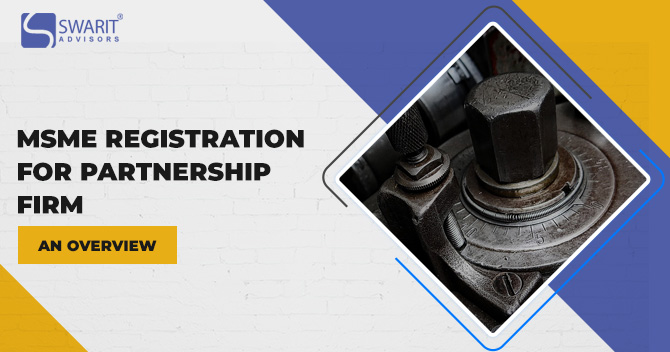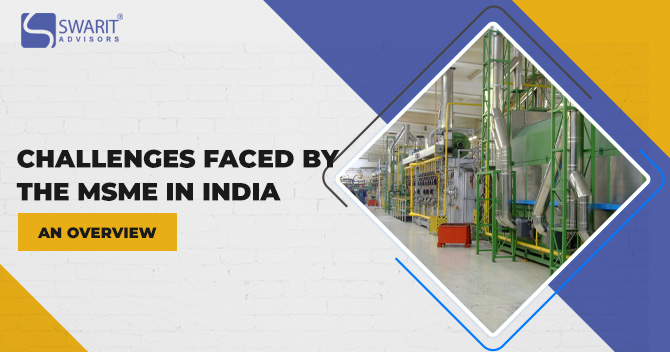MSME Registration in India: Benefits and Process

Shivam Narwal | Updated: Apr 10, 2023 | Category: MSME
The MSME sector is an essential component of the Indian economy, playing a crucial role in employment generation, innovation, and overall economic growth. This sector employs over 110 million people and contributes around 30% of the country’s GDP. Despite its significance, MSMEs face various challenges, including limited access to finance, inadequate infrastructure, and technological backwardness. In response to these challenges, the government of India has launched various schemes and programs to promote the growth and development of the MSME sector.
One such scheme is MSME registration, which offers several benefits, including access to credit, subsidies, and government schemes. With the help of technology, entrepreneurs can now register their MSMEs online in India, simplifying the registration process and reducing the time and cost involved. In this article, we will explore the process of MSME registration online in India, including its benefits and types. We will also provide a step-by-step guide to assist entrepreneurs in registering their MSMEs online.
Table of Contents
Explanation of MSME
Before we delve into the details of MSME registration, let’s understand what MSMEs are and their significance in the Indian economy. MSMEs are classified based on their size, investment, and turnover. The Government of India introduced the Micro, Small and Medium Enterprises Development (MSMED) Act in 2006[1] to define and regulate MSMEs in India. According to the Act, MSMEs are defined as enterprises engaged in producing, manufacturing, processing or preserving goods and commodities.
The MSMED Act classifies MSMEs into three categories based on their investment in plant and machinery or equipment and annual turnover. These categories are:
- Micro Enterprises: Micro enterprises in India are defined as those businesses where the investment in plant and machinery or equipment does not exceed INR 1 crore and the annual turnover does not exceed INR 5 crores.
- Small Enterprises: Small enterprises are characterized by an investment in plant and machinery or equipment that is less than INR 1 crore but is not exceed INR 10 crore and an annual turnover that does not exceed INR 50 crores.
- Medium Enterprises: Enterprises that invest in plant and machinery or equipment ranging from over INR 10 crores but not exceeding INR 50 crores and have an annual turnover that does not exceed INR 250 crores are classified as medium-sized enterprises.
It should be emphasized that the definition of MSMEs can differ depending on the industry and sector. Nonetheless, the MSMED Act offers a broad definition commonly recognized across sectors. All qualifying enterprises must register as MSMEs to take advantage of the government’s benefits and programs.
Types of MSMEs
MSMEs in India are classified into three types based on their size and investment, as per the MSMED Act. These types are:
- Manufacturing Enterprises: Manufacturing enterprises are those enterprises that are engaged in the production or manufacturing of goods. These include small-scale industries, food processing units, textile manufacturers, etc.
- Service Enterprises: Service enterprises are those enterprises that provide services to customers. These include consulting firms, software development companies, restaurants, and other service-based businesses.
- Trading Enterprises: Trading enterprises are those engaged in buying and selling goods. These can include wholesale and retail traders, importers, and exporters.
Apart from these broad classifications, MSMEs can be further categorized based on their industry and sector. The government of India has also introduced specific schemes and programs for MSMEs in certain sectors, such as the National Manufacturing Competitiveness Programme (NMCP) for manufacturing MSMEs and the Credit Guarantee Fund Scheme for Micro and Small Enterprises (CGTMSE) for service MSMEs.
It is important to note that MSME classification may vary across sectors and industries. However, the essential criteria of investment and turnover per the MSMED Act remain constant for all MSMEs.
Benefits of MSME Registration
MSME registration provides several benefits to entrepreneurs and small businesses in India. Some of the critical benefits of MSME registration are:
- Access to Government Schemes and Programs: MSMEs registered with the government can avail of various schemes and programs such as subsidies, tax exemptions, and financial assistance provided by the government to promote and support small businesses. For example, the Prime Minister’s Employment Generation Programme (PMEGP) provides financial assistance to entrepreneurs for setting up new businesses.
- Easy Access to Credit: MSME registration provides credibility to small businesses and makes it easier to access credit and loans from banks and financial institutions. Registered MSMEs are considered more trustworthy and creditworthy than unregistered businesses.
- Protection of Intellectual Property: MSME registration protects entrepreneurs and small businesses against intellectual property theft and infringement. It allows them to secure their trademarks, patents, and copyrights, thereby protecting their business interests.
- Tendering Benefits: MSMEs registered with the government are given preference in government tenders and contracts. This significantly boosts their business and helps them expand their operations.
- Market Access: MSME registration also provides market access to small businesses by making them eligible for various marketing assistance and promotional schemes offered by the government. This helps them reach a broader customer base and grow their business.
- Other Benefits: MSME registration also provides various other benefits, such as easy access to technology and infrastructure, assistance in getting licenses and certifications, and reduced costs for compliance with government regulations.
Overall, MSME registration is crucial for small businesses and entrepreneurs in India to avail of various government schemes and programs and grow their businesses in a regulated and secure environment.
Process for MSME Registration
MSME registration in India is an uncomplicated and clear-cut procedure that can be accomplished online. The subsequent the stages implicated in MSME registration:
- Visit the Udyam Registration Portal: The first step is to visit the Udyam Registration portal, the official government portal for MSME registration. Here, you will need to provide your Aadhaar number for authentication.
- Fill in the Application Form: Complete the online application form once your Aadhaar number is authenticated. The application form will require you to provide basic details such as your name, PAN, GSTIN, and other relevant information about your business.
- Provide Business Details: After filling in your details, you will need to provide information about your business such as the type of enterprise, location, and date of commencement.
- Submit Documents: Afterward, the subsequent step is to upload the obligatory credentials, including a PAN card, Aadhaar card, and additional business registration documents. The papers must be in PDF format and should be scanned appropriately.
- Verification and Payment: After submitting the documents, you must verify the details in the application form. Once verified, you will need to make the payment for the registration process.
- Receive the Certificate: Once the payment is made, you will receive a confirmation message and the Udyam registration certificate at your registered email address.
It is important to note that MSME registration is a one-time process, and the certificate obtained is valid for a lifetime. However, if there are any changes in the business, such as investment or turnover, the entrepreneur needs to update the information on the Udyam Registration portal.
Conclusion
MSME registration is an essential step for entrepreneurs and small businesses in India to avail themselves of various benefits and schemes provided by the government. It provides credibility to the business, access to credit, protection of intellectual property, and several other benefits. The registration process is now simple and hassle-free, and entrepreneurs can complete it online through the Udyam Registration portal. However, it is crucial to note that MSME registration is not mandatory, and businesses can continue to operate without registering. But by doing so, they will benefit from several opportunities and benefits the government provides to promote and support small businesses. Therefore, it is highly recommended that small businesses and entrepreneurs register under the MSME scheme to take advantage of these benefits and grow their businesses in a regulated and secure environment. In conclusion, MSME registration is a vital step for the growth and development of small businesses in India. Entrepreneurs should take advantage of this scheme to access the various benefits provided by the government.
Also Read:
How MSME Registration helps in Business Growth
MSME Registration for Partnership Firm – An Overview














